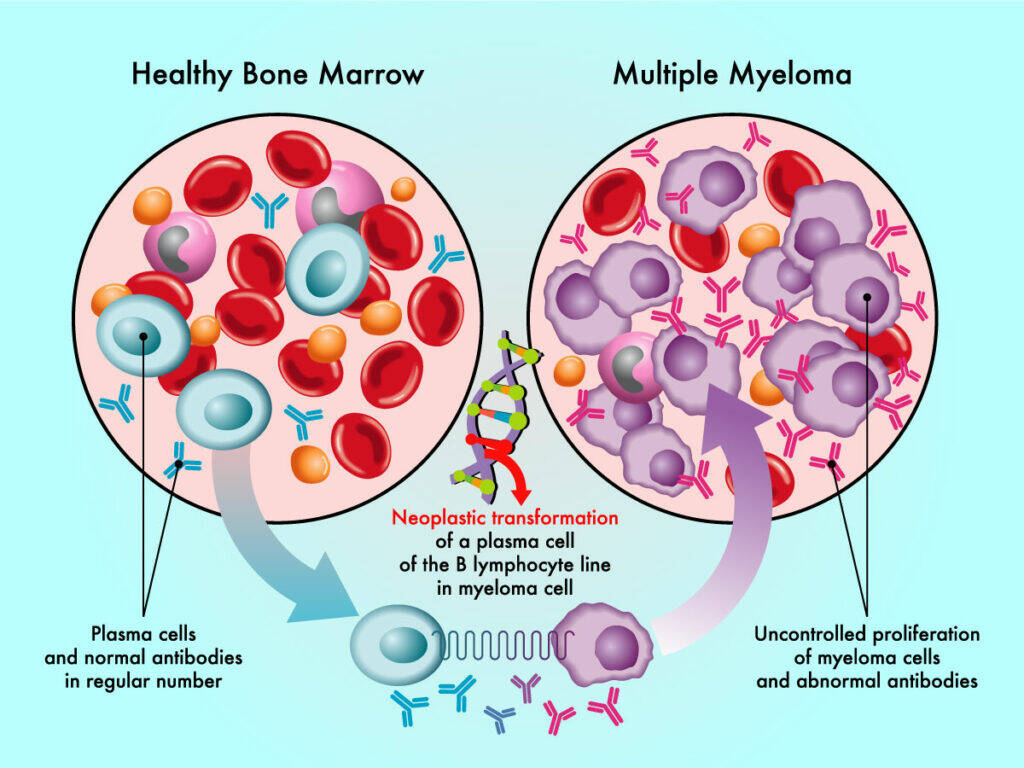
The human gut is home to trillions of bacteria, collectively known as the gut microbiome. Emerging research suggests that the gut microbiome plays a crucial role in immune function, inflammation, and even cancer progression. Could there be a link between gut health and multiple myeloma? Let’s explore how your microbiome might impact your cancer journey.
Understanding Multiple Myeloma
What is multiple myeloma?
- A type of blood cancer that affects plasma cells in the bone marrow.
- Leads to weakened immunity, bone damage, and kidney issues.
The role of the immune system in myeloma
A dysregulated immune system contributes to both the development and progression of the disease.
The Gut Microbiome & Its Role in Immunity
- The gut microbiome influences immune response, inflammation, and metabolism.
- Studies show that an imbalanced microbiome (dysbiosis) can contribute to chronic inflammation, potentially fueling cancer growth.
- A healthy microbiome strengthens the gut-bone marrow axis, supporting immune function against myeloma cells.
How Gut Health Affects Myeloma Progression & Treatment Response
Inflammation & Tumor Growth
- Harmful gut bacteria can trigger pro-inflammatory cytokines, worsening myeloma progression.
- Chronic inflammation weakens the body’s ability to fight cancer.
Impact on Treatment Effectiveness
- Certain gut bacteria enhance the effectiveness of immunotherapy and chemotherapy.
- Antibiotic overuse may negatively impact gut flora, potentially reducing treatment success.
Nutrient Absorption & Metabolism
- A damaged microbiome affects nutrient absorption, impacting overall energy levels and recovery.
- Good gut bacteria help metabolize polyphenols (found in fruits and vegetables), which have anti-cancer properties.
Can You Improve Your Microbiome to Support Myeloma Treatment?
Dietary Changes:
- Increase fiber-rich foods (fruits, vegetables, whole grains) to feed beneficial bacteria.
- Include probiotics (yogurt, kefir, fermented foods) to restore gut flora.
- Reduce processed foods and refined sugar, which promote harmful bacteria.
Prebiotics & Supplements:
- Prebiotic-rich foods (garlic, onions, bananas) help good bacteria thrive.
- Consider curcumin, omega-3s, and vitamin D for their anti-inflammatory effects.
Exercise & Stress Management:
- Regular movement boosts gut diversity and reduces inflammation.
- Mindfulness, meditation, and adequate sleep support gut health.
Conclusion:
Dr. M.G. Giriyappagoudar, a senior radiation oncologist from North Karnataka and head of TumorBoard.Care, emphasizes that gut health could play a crucial role in managing multiple myeloma. While more research is needed, nurturing a balanced microbiome through diet and lifestyle changes may enhance immune function, reduce inflammation, and potentially improve treatment response.
DR. M G GIRIYAPPAGOUDAR

DMRT, MDRT (CMC Vellore, TN)
Consultant Radiation Oncologist, Hubli

